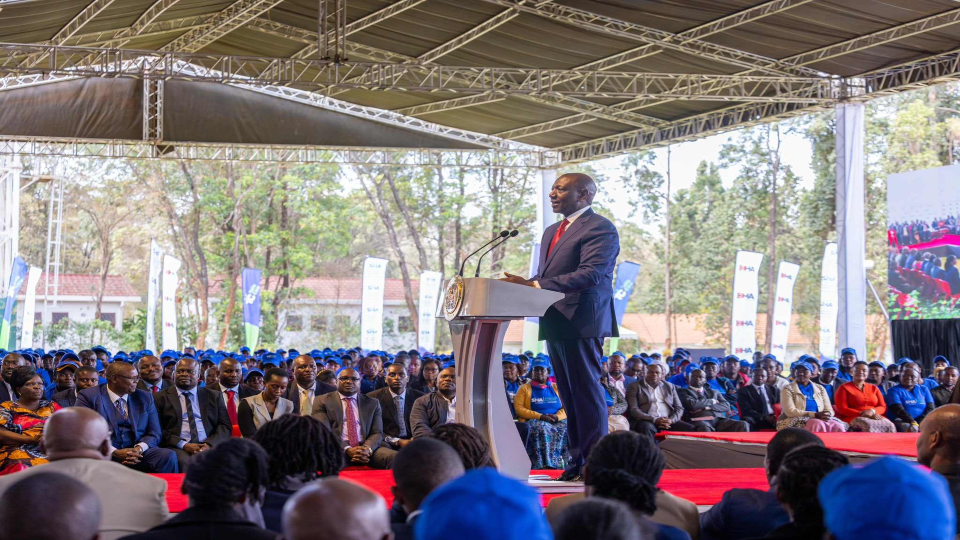RUPHA Raises Alarm Over Legal Issues in SHA Indigent Cover Rollout
The Rural Private Hospitals Association of Kenya (RUPHA) has expressed significant concerns regarding President William Ruto’s rollout of the Social Health Authority (SHA) indigent cover, designed to provide healthcare access for poor and vulnerable households. The association argues that the initiative, while commendable, was launched without adhering to the legal provisions outlined in the Social Health Insurance Act of 2023, particularly regarding funding and beneficiary identification.
During a recent announcement, President Ruto revealed that the government had allocated 4.4 billion Kenyan Shillings to the SHA to cover approximately 2.2 million indigents, equating to about 558,000 households. He also commended various leaders and philanthropists for their contributions, noting that Members of Parliament (MPs) had collectively sponsored SHA coverage for 508,000 individuals. Ruto further highlighted the generosity of a Kenyan donor who pledged to fund coverage for 113,000 citizens and encouraged MPs to utilize Constituency Development Funds (CDF) to support those unable to afford healthcare in their constituencies.
Ruto emphasized a collective commitment to ensuring universal healthcare, stating that leaders and philanthropists are stepping up to share the burden of covering costs for those in need. He affirmed that efforts would continue until every Kenyan unable to pay is enrolled in the SHA scheme, ensuring access to universal healthcare.
However, RUPHA chairperson Brian Lishenga cautioned that the rollout fails to comply with the legal requirements stipulated in the SHA Act and its regulations. These laws mandate that funds for indigent and vulnerable groups be appropriated by the National Assembly and county governments. Lishenga pointed out that neither the National Treasury nor most county governments have allocated the necessary funds for the program. He estimated that Kenya has at least five million indigents, far exceeding the 2.2 million households targeted by the current initiative, indicating a significant gap in coverage.
Lishenga further highlighted that the law requires a means-testing process to identify eligible beneficiaries, such as orphans, widows, widowers, persons with disabilities, and the elderly, before their enrolment in the SHA scheme. He noted that this process has not yet been initiated, and there is no evidence that the National Assembly has appropriated funds for the launched program. Additionally, most counties have neither identified indigent populations nor allocated funds to be remitted to the SHA, further undermining the initiative’s legal foundation.
During the launch, the SHA introduced a webpage to facilitate sponsorship of vulnerable households. The portal displayed contributions, including 4.4 million Kenyan Shillings from President Ruto and a substantial 900 million Kenyan Shilling donation from an anonymous donor. Other notable contributions include support for 150 beneficiaries from Refugee Point, 2,500 from Mombasa Cement, and 22,155 from UNHCR. At the county level, Cheptiret Kipchamo Ward in Uasin Gishu supports 291 individuals, while Baringo, Mombasa, and Lamu counties each have enrolled 20,000 beneficiaries.
Several politicians have also contributed to the SHA initiative. Contributions include 5.5 million Kenyan Shillings from Maraa MP Japheth Miriti, 1.9 million from Samburu West MP Naisula Lesuuda, 2.4 million from Turbo MP Janet Jepkemboi, 2.3 million from Lang’ata MP Phelix Odiwuor, and 3.6 million from Nakuru Town East MP David Gikaria. Additional donations include 2.8 million from Laikipia East MP Mwangi Kiunjuri, 23 million from Trans Nzoia Governor George Natembeya, 1.9 million from Bahati MP Irene Njoki, 5.6 million from Migori Governor Ochilo Ayacko, 117 million from Murang’a Governor Irungu Kang’ata, 3.4 million from Kikuyu MP Kimani Ichung’wah, and 3.6 million from Mombasa Governor Abdulswamad Shariff.
Lishenga stressed that sustainable medical coverage for vulnerable and indigent populations can only be achieved through proper appropriation of funds by the National Assembly and county governments, as required by law. He explained that SHA regulations mandate the National Treasury to deduct and remit funds, with county finance chiefs following suit, to ensure continuous healthcare coverage year after year. While welcoming the initiative, Lishenga urged the National Assembly to fulfill its role in allocating funds and called on the SHA and counties to identify needy households across Kenya.
In response, President Ruto defended the legality of the SHA rollout, asserting that the Ministry of Health, in collaboration with the Ministry of Labour, has compiled a list of households eligible for support. He stated that this list is accessible to leaders, philanthropists, donors, and development partners who wish to assist deserving families, ensuring compliance with legal requirements. Ruto also noted that the SHA has accredited approximately 9,000 hospitals, allowing enrolled Kenyans to access care at both public and private facilities without out-of-pocket expenses.
Despite these assurances, Lishenga criticized the launch as an act of goodwill overly reliant on sponsorship rather than lawful budgetary allocations. He reiterated that without proper funding mechanisms and adherence to legal processes, the sustainability of the SHA indigent cover remains at risk.


